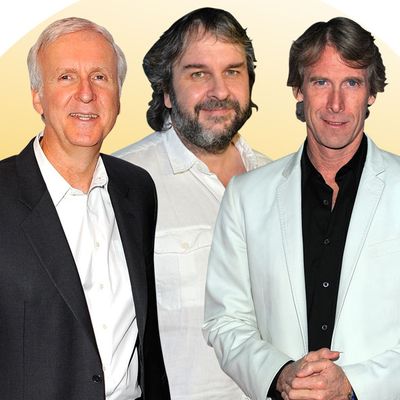
It was hard to get Peter Jackson into the director’s chair of The Hobbit, but it’ll be even more difficult to get him out of it. Jackson spent so much of his life helming the massive Lord of the Rings trilogy that he seemed eager to hand off Hobbit duties to Guillermo Del Toro back in 2008, but after Del Toro dropped out and Jackson reluctantly took the helm of the Rings prequel himself, he seemed to get a second wind: Today, Jackson announced that he’s expanding the formerly two-film Hobbit project into its own trilogy. Those deeply steeped in J.R.R. Tolkien will debate whether the slight Hobbit contains enough material to rival the three Rings films, but it doesn’t take a Middle-earth historian to notice that Jackson will ultimately be directing six films in a single franchise, a time commitment that was unprecedented for an A-list director to take on until just recently.
Just look at Michael Bay: When the highly paid helmer destroyed Chicago for Transformers: Dark of the Moon, it seemed to be an emphatic capper on his Transformers trilogy … and then Bay signed on to direct the fourth movie, even though his lead actor Shia LaBeouf had the good sense to get out now. Similarly, James Cameron had long envisioned his Avatar franchise as a trilogy … and then Sigourney Weaver revealed last month that Cameron was weighing an Avatar 4 too. (Cameron recently called that idea “premature,” but that’s different than a dismissal.) How old will the 57-year-old Cameron be when he finally turns his attention to a new project? Will he ever?
The allure of a trilogy can be pernicious enough — plenty of would-be franchises have sputtered out by saving too much of the good stuff for sequels that never came — but when directors of this caliber begin committing themselves to fourth, fifth, and sixth sequels, it’s cause for concern. Jackson, Cameron, and Bay are part of a very small, very elite group of directors who can get just about any movie green-lit, and yet they’re devoting so much of their time to more of the same. Wouldn’t we rather see what new creative endeavors they could come up with, while they still have the wherewithal and studio support to do it?
Even more worrisome is the trend of shooting so many of the sequels back-to-back. Michael Bay made three Transformers movies before he ventured outside of the franchise to helm his upcoming heist movie Pain and Gain; Cameron rejected an offer to direct Angelina Jolie as Cleopatra in order to maintain his focus on the Avatar films; and Jackson shot both Hobbit films at once and will film the additional material for the new sequel in short order. While there are certainly financial incentives to shooting all those movies in giant career clumps, there’s something lost creatively when a director single-mindedly dedicates himself to one thing without taking the time to step away and reassess his franchise.
Take Steven Spielberg, for example: Though he, too, recently succumbed to a needless fourth installment of the Indiana Jones series, Spielberg made some of his best films in between the first few Indy movies, shooting E.T. after Raiders of the Lost Ark, and The Color Purple and Empire of the Sun in between Temple of Doom and Last Crusade. Robert Zemeckis made the tremendous Who Framed Roger Rabbit? in between Back to the Future and its two-part sequel, and even Cameron spent the time in between The Terminator and its follow-up by shooting Aliens and The Abyss. There’s no question that making those two movies prepared Cameron for the bigger challenges of T2, so it’s a shame that he won’t take the skills he’s learned from Avatar to make something totally different, then marshal those lessons for Avatar 2. That’s an approach that served Christopher Nolan well, as the blockbuster filmmaker convinced Warner Bros. to wait on him in between Batman movies so that he could spend his capital on outside efforts like The Prestige and Inception.
When a tentpole film of that magnitude can demand two to three years of a filmmaker’s life, you can see the necessity for a director to recharge from time to time: It’s why Joss Whedon snuck the shooting of an entirely new indie film, a modern-day update of Much Ado About Nothing, into the slim production break he was given after The Avengers wrapped filming. “I really care about those [Avengers] characters, they speak to me,” Whedon said at Comic-Con, before admitting that he was a bit reluctant to make The Avengers 2, since it’s another project he “didn’t originate.” In today’s franchise climate, where most directors are happy to make “til death do us part” vows to their meal-ticket movies, that’s an attitude that’s truly superheroic.




